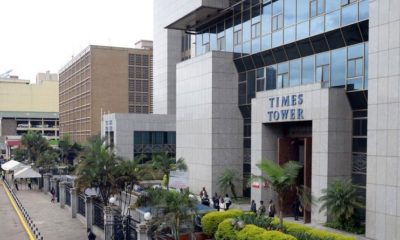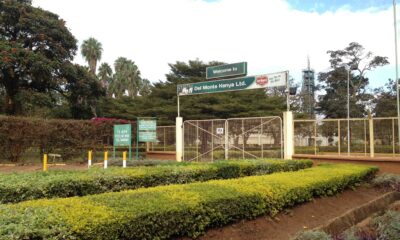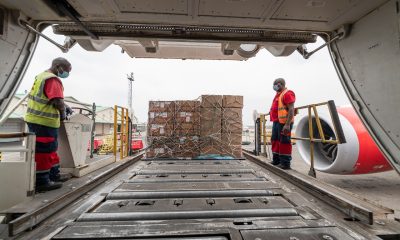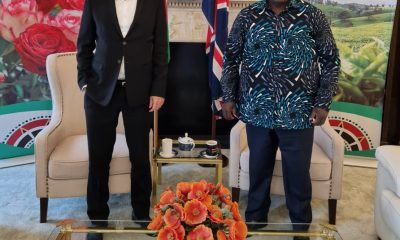Business
KRA Axes 20 Clearing And Forwarding Firms Engaging In Counterfeit Goods And Tax Evasion

The Kenya Revenue Authority (KRA) has flagged the operations of 20 clearing and forwarding agents based at the Port of Mombasa, setting them up for tighter scrutiny as it moves in to net tax cheats.
KRA deputy commissioner for Revenue J Kaguru says in a letter dated November 11 that the firms were found to have ‘non-compliance issues’ after several risk analyses.
The clearing and forwarding agents include Regal Freighters, Delta Express, Subukia Holdings, Greentop Logistics, Zanaa Freights, Riam Logistics as well as Utmost Freight Matters Limited.
Others are Ozone Freight Forwarders Limited, Adelcus Agencies, Wiljones Logistics, Venues Kenya Limited and Neline Shipping and Logistics Enterprises.
“The attached list of 20 clearing agents have been found to have compliance issues, after several risk analysis. All consignments declared by the clearing agents in the list to be considered as high risk,” said Mr Kaguru in the letter. KRA red lists entities that it finds to have higher tax risks.
The taxman further stated that going forward, and from the date of the issuance of the memo all kitenge and textile materials must be verified 100 percent, all photos taken and attached in the system.
The taxman, currently racing to bring more people into the tax bracket and curb tax cheating in the quest to meet targets, says that to enhance compliance, long room pass will be issued upon review by HDO officers on duty.
All cargo release at station level must also be approved online by the station managers.
Station managers must also be enjoined and given online approval before release of the consignments.
“The purpose of this communication therefore, is to request Document Process Centers, National Targeting Centers and the release stations to make appropriate arrangements to comply,” he says.
According to the KRA’s communication, the black listed firms have been engaged in the importation of counterfeit, poor quality goods prompting the crackdown.
African wax print fabric commonly known as ‘Kitenge’ will now undergo 100 percent verification in stringent measures by the taxman aimed at subjecting importers to tighter checks in a race to seal tax leakages.
The Kenya Revenue Authority (KRA) says in a memo dated November 11 that the checks would ascertain the description, quality and quantity of the fabric to allow for proper valuation.
“Going forward, from the date of this memo, it is now expected that clearance of Kitenge and textile materials to be verified 100 percent and photos to be taken and attached in the system,” says the KRA in the memo.
The development is set to delay the clearance of the fabric, which is gaining traction in the region. Importers have been using arbitrary values when declaring Kitenge at the port of entry, which appears to disregard the quality of the fabric.
Some importers have also been using generic description — “textile materials” — or falsely declaring their goods as mixed fabrics to avoid paying the requisite duty for full container loads of Kitenge.
But to seal the loopholes, KRA says all imported consignments described as “textile materials” should also be subjected to physical verification before releasing at the places of discharge.
Such consignments, the taxman says, should be excluded from the “Port Clearance Model”, which allows release without physical verification.
“To avert the release of the many pending consignments of Kitenge or textile materials, without proper verification, about 60 containerised cargo will now be subjected to close monitoring before entry,” says the KRA.
The taxman is subjecting Kitenge and other textile materials to tighter checks barely a day after it flagged the operations of 20 clearing and forwarding agents based at the Mombasa port.
The firms were found to have “non-compliance issues” after several risk analyses.
The KRA has been intensifying its crackdown on tax cheats using various databases, including bank statements, import records, Kenya Power records, motor vehicle registration details, water bills and data from the Kenya Civil Aviation Authority, which reveals individuals who own assets such as aircraft.
The taxman has in the past two years also been seeking details of suppliers and contractors hired by county governments.
This followed a steep increase in imports of the luxury goods and multi-million-shilling investments in real estate — an indication that some crooks could be evading payment of tax.
Last week, KRA commissioner-general Githii Mburu said his officers are now spending time on social media, trolling Kenyans posting photos of luxury cars, throwing expensive parties, living lavishly to ensure their taxes are in tandem with their image.
The taxman wants socialites and individuals who display lavish lifestyles on the interwebs to pay their fair share of taxes as it races to bring more people into the tax bracket.
Kenya Insights allows guest blogging, if you want to be published on Kenya’s most authoritative and accurate blog, have an expose, news TIPS, story angles, human interest stories, drop us an email on [email protected] or via Telegram
-

 Grapevine2 weeks ago
Grapevine2 weeks agoAlleged Male Lover Claims His Life Is in Danger, Leaks Screenshots and Private Videos Linking SportPesa CEO Ronald Karauri
-

 Lifestyle2 weeks ago
Lifestyle2 weeks agoThe General’s Fall: From Barracks To Bankruptcy As Illness Ravages Karangi’s Memory And Empire
-

 Grapevine7 days ago
Grapevine7 days agoRussian Man’s Secret Sex Recordings Ignite Fury as Questions Mount Over Consent and Easy Pick-Ups in Nairobi
-

 Investigations4 days ago
Investigations4 days agoMulti-Million Dollar Fraud: Three Kenyans Face US Extradition in Massive Cybercrime Conspiracy
-

 Economy3 days ago
Economy3 days agoIran Demands Arrest, Prosecution Of Kenya’s Cup of Joe Director Director Over Sh2.6 Billion Tea Fraud
-

 Investigations2 weeks ago
Investigations2 weeks agoEpstein’s Girlfriend Ghislaine Maxwell Frequently Visited Kenya As Files Reveal Local Secret Links With The Underage Sex Trafficking Ring
-

 News2 weeks ago
News2 weeks agoState Agency Exposes Five Top Names Linked To Poor Building Approvals In Nairobi, Recommends Dismissal After City Hall Probe
-

 News2 days ago
News2 days agoTHE FIRM IN THE DOCK: How Kaplan and Stratton Became the Most Scrutinised Law Firm in Kenya



























